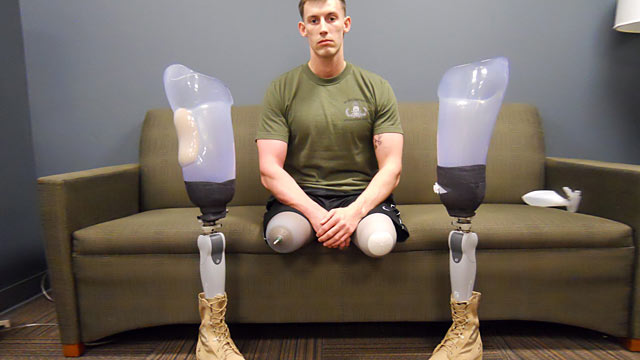
An ex-Marine deals with the loss of both legs.
US Slow To Give a F**k About Veterans’ Injuries
To Urinary, Genital, and Reproductive Systems
Bill Berkowitz / The Daily Kos
[Author’s Note: This story is an update of an article I wrote in 2011]
(March 29, 2023) — Last week marked the 20thanniversary of the George W. Bush administration’s launching of the invasion of Iraq; “Shock and Awe” based on lies and disinformation. Several thousand American soldiers were killed and thousands more wounded, while several hundred thousand Iraqi civilians were killed.
American soldiers that returned from serving in Iraq and Afghanistan face struggles that are never depicted in any Super Bowl or March Madness military recruitment “Be all you can be” television advertisement, or military-themed video game.
According to a recent report by the UT Southwestern Media Center Newsroom, “Over the past two decades, unprecedented numbers of service members were hit by ground explosives during the conflicts in Iraq and Afghanistan, causing severe injuries.
In addition to losing limbs, these troops often suffered genitourinary (GU) injuries to their urinary, genital, and reproductive systems.” Although these uniquely devastating wounds are often be hidden from view, psychological consequences abound. After years of benign neglect, researchers are tackling urogenital health issues.
Between 2001 and 2013, more than 1,500 men serving in the United States military in Iraq and Afghanistan suffered injuries to the penis, testicles or urinary system, according to a February 2017 report published in The Journal or Urology (https://www.auajournals.org/article/S0022-5347(16)30970-3/fulltext).* The report, as described by The New York Times’ Denise Grady, is considered “to be the most comprehensive review of so-called genitourinary injuries in veterans.”
Evacuation of a seriously injured US female soldier.
Grady’s report pointed out that “The number of cases is ‘unprecedented’ and the injuries ‘uniquely devastating’ because they can impair a man’s ability to have sex, father children or urinate normally,” according to the Journal’s report.
“Most of the wounded men – 94 percent – were 35 or younger, in ‘their peak years of sexual development and reproductive potential,” the report grimly noted.
According to a dallasnews.com video, “the average age of those injured is twenty-four, three out of four have injuries to the penis, scrotum or testicles, one-third had injuries that are classified as severe, eighty-four of them suffered severe injuries to the penis.”
While these wounds suffered by US soldiers serving in the wars in Iraq and Afghanistan, hasn’t received nearly the attention it deserves, more than a decade ago it was recognized as a burgeoning problem.
In November 2011, Bob Drury, Men’s Health contributing editor, wrote: “The signature physical wound of the war in Afghanistan begins when you step on a homemade bomb. Most of these are built with the fertilizer ammonium nitrate, an ingredient widely available throughout Afghanistan.
The detonation, triggered either by a buried pressure plate or, less often, a command wire operated by a nearby enemy, instantly pulverizes the flesh, bone, tissue, and muscle of one or both of your lower limbs. In all likelihood, the force of the explosion will sever the nerves in your leg or legs, and yet you will experience little pain. Surprisingly, as shock sets in and you lie in your pooling blood, you may not feel anything but a vague sense of pressure, as if a strong man were wrapping both hands around one of your calves and squeezing as hard as he could.
“In many cases, the force of the explosion also travels straight up into your genital and pelvic area, blasting tiny shards of rock and dirt into your torso between your front and rear Kevlar body-armor flaps,” Drury continued. “If all or part of your ‘package’ is not blown off by the detonation itself, the flying debris from the blast often penetrates soft tissue, leaving you vulnerable to penile, scrotal, testicular, and rectal infections. If the damage is bad enough, it could even lead to a full or partial amputation of your genitals.”
Because of better gear (Kevlar underpants) than in previous wars, quicker battlefield medical intervention, and immediate airlifting to extensive medical facilities, soldiers suffering from injuries that once would have been fatal, are surviving. But their survival has come with agonizing misery and anguish.

Pentagon solution to “combat circumscision” — Kevlar underwear.
“Surviving means repeat surgeries, re-imagining relationships and wondering if you’ll ever enjoy sex or have children,” the dallasnews.com’s Dr. Seema Yasmin, a physician and former CDC epidemiologist, a professor at the University of Texas at Dallas and a staff writer at The Dallas Morning News, reported, “And while there are more conversations about brain injuries and post-traumatic stress disorder in troops, experts and families say there’s not enough discussion about the men who return home with the most taboo of injuries.”
For their part the military has not only been forced to deal with the psychological blowback, developing new medical treatments, and also with financial issues such as payment for freezing sperm or eggs before deployment. Congress did pass a law providing funding for fertility treatments, including in-vitro fertilization, for veterans suffering from these injuries.
Dr. Steven J. Hudak, a former Army surgeon and a lieutenant colonel at Brooke Army Medical Center in San Antonio, has cared for many service members who suffered GU injuries was one of the authors of the Journal of Urology report. “Many of [the wounded] have been my patients,” he said. “We are trying to tell their story and display the burden of the problem.”
The dallas.com video points out that, “new surgical techniques such as a penis transplant offers hope to those who suffer penis amputation.“ According to The New York Times, while “doctors at several medical centers hope to offer penis transplants from deceased organ donors to wounded veterans,” the operation has only been performed once in the US, last year at Massachusetts General Hospital in Boston, and the recipient was not a veteran.
According to The New York Times, “Make and female veterans with genitourinary injuries are being studied as part of a Defense Department project called TOUGH, for Trauma Outcomes and Urogenital Health.“ Although less likely to suffer the type of injuries male soldiers are suffering, nevertheless Dr. Hudak said that injuries to women is the subject of a future report.
Clearly, more research needs to be done and more physical and mental health services need to be provided for these veterans. According to a December 3, 2022 Military Times story by Roxanna Delgado, while GU injuries are “increasingly survivable … .little research has been completed on the long-term health of the men and women who survive such wounds, which means we may not be providing these veterans with the best possible care”
According to Delgado, an epidemiologist, health scientist and assistant professor at the University of Texas Health Science Center at San Antonio, “healthcare experts from the University of Texas Health Science Center at San Antonio and Brooke Army Medical Center joined with others from the University of California Davis to launch a survey designed to fill the critical gap in research around GU injuries.
The Trauma Outcomes and Urogenital Health (TOUGH) Project (https://toughprogram.uthscsa.edu/) will generate a better understanding of how well those with GU injures are recovering, what their lives are like, and if we can make any improvements to their medical treatments. Veterans who sustained these wounds during the wars in Iraq and Afghanistan (i.e., Operation Iraqi Freedom, Operation Enduring Freedom or Operation New Dawn) may participate.

Footnote
* “From October 2001 to August 2013, 1,367 male US service members sustained 1 or more genitourinary injuries. The majority of injuries involved the external genitalia (1,000, 73.2%), including the scrotum (760, 55.6%), testes (451, 33.0%), penis (423, 31%) and/or urethra (125, 9.1%). Overall more than a third of service members with genitourinary injury sustained at least 1 severe genitourinary injury (502, 36.7%).
Loss of 1 or both testes was documented in 146 men, including 129 (9.4%) unilateral orchiectomies and 17 (1.2%) bilateral orchiectomies. Common comorbid injuries included traumatic brain injury (549, 40.2%), pelvic fracture (341, 25.0%), colorectal injury (297, 21.7%) and lower extremity amputations (387, 28.7%).”
— “Epidemiology of Genitourinary Injuries among Male US Service Members Deployed to Iraq and Afghanistan: Early Findings from the Trauma Outcomes and Urogenital Health (TOUGH) Project” – The Journal or Urology, February 2017
Posted in accordance with Title 17, Section 107, US Code, for noncommercial, educational purposes.
